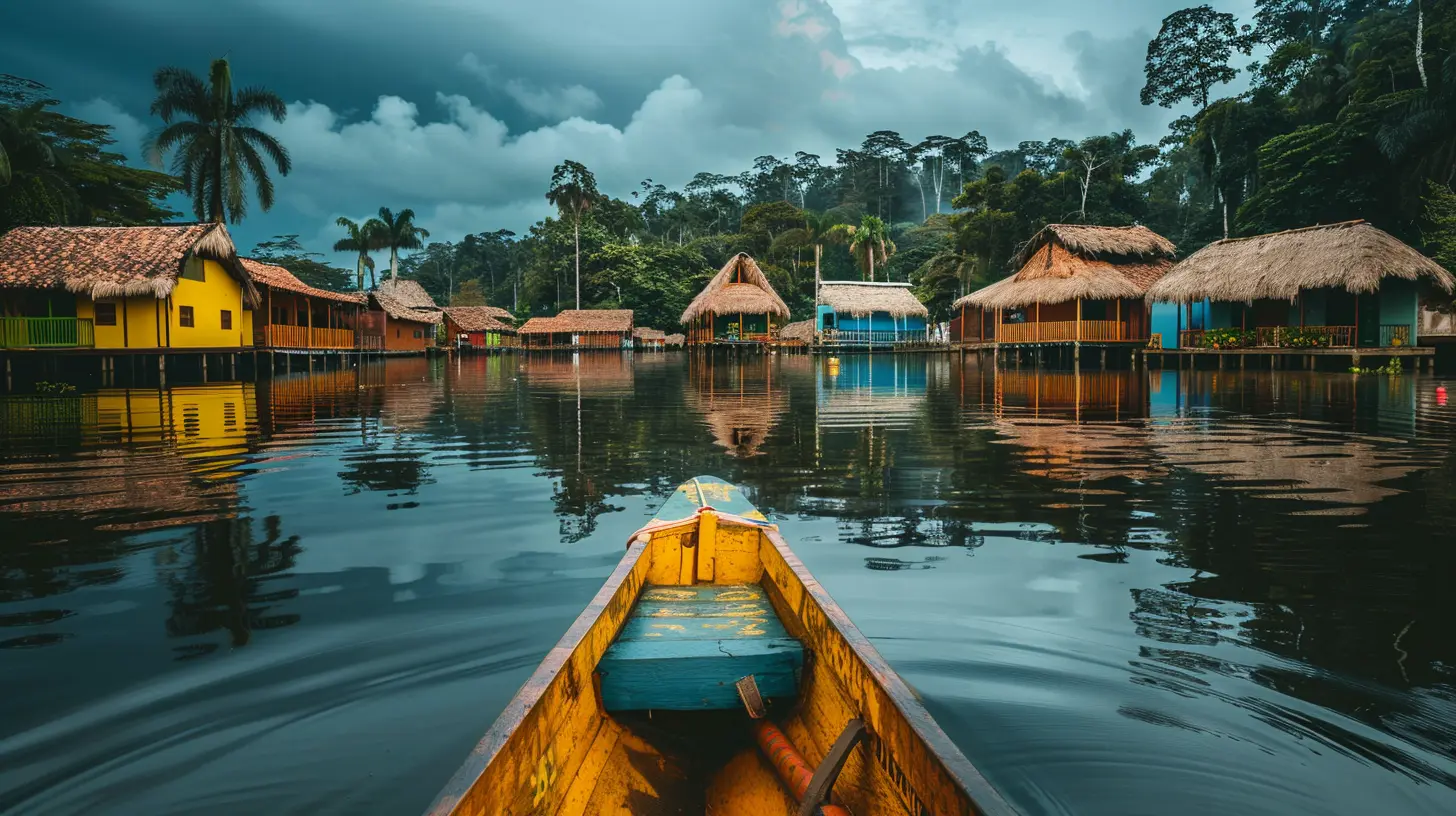Beyond the Tourist Trail: Sustainable Travel for Authentic Experiences
21 January 2025
Have you ever returned from a vacation feeling like you didn’t truly experience the place? Like you skimmed the surface, snapping photos of over-visited landmarks without really connecting with the culture? You’re not alone. In today’s fast-paced world of Instagram-perfect destinations and TikTok-worthy adventures, it’s easy to get caught up in the rush. But what if I told you there’s a different way to explore the world? A way that’s not only better for the planet but also gives you a deeper, more meaningful travel experience.
Welcome to the world of sustainable travel – the journey that goes beyond the tourist trail, where the focus is on authenticity, connection, and responsibility.

What Is Sustainable Travel?
Before we dive in, let’s get clear on what sustainable travel actually means. Sustainable travel isn't just about traveling in an eco-friendly way (although that’s a big part of it). It’s about much more than reducing your carbon footprint. It’s about making conscious choices that positively impact the environment, local economies, and the people you meet along the way.In a nutshell, sustainable travel aims to:
1. Preserve natural resources – by minimizing environmental harm.
2. Support local communities – by contributing to the local economy and respecting cultural heritage.
3. Offer authentic experiences – by fostering genuine connections and understanding the places you visit on a deeper level.
Think of it as the difference between fast food and a home-cooked meal. One might be quick and convenient, but it doesn’t nourish you the way something made with love and care does. Sustainable travel is that home-cooked meal for your soul.

Why Should You Care About Sustainable Travel?
You might be wondering, "Why should I care about sustainable travel? Isn’t travel supposed to be about fun and relaxation?" Absolutely, but here’s the thing: the way we travel can make or break the experience – not just for us, but for future generations as well.Ever visited a beach and found plastic bottles washed up on the shore? Or maybe you’ve seen locals crowded out of their own city by the influx of tourists? These are the unintended consequences of mass tourism. And the reality is, if we don’t start traveling more responsibly, we risk losing the very beauty and culture we travel to experience.
Sustainable travel is about finding balance. It’s about enjoying the world without taking more than you give. It’s travel that feels good – in every sense of the word.

The Benefits of Going Beyond the Tourist Trail
By choosing to travel sustainably, you’re not just checking off another box on your bucket list. You're embracing a whole new way of exploring that delivers far richer, more rewarding experiences. Here’s how:1. Authentic Cultural Exchanges
When you step off the beaten path and connect with local communities, you experience culture in its genuine form. You’re not just watching a performance or visiting a museum – you’re sharing meals with locals, learning traditions firsthand, and hearing stories passed down through generations.Imagine staying in a small, family-run guesthouse rather than a chain hotel. You’ll likely be treated to home-cooked meals, local tips, and the opportunity to form lasting relationships. It’s these moments that leave a lasting impact, far beyond any souvenir.
2. Preserving Natural Wonders
Natural beauty is one of the main reasons people travel, but it’s also one of the most fragile resources. Popular tourist hotspots often face issues like overcrowding, littering, and environmental degradation. By exploring lesser-known destinations and adopting eco-friendly practices, you help preserve these ecosystems for the future.For example, instead of visiting an overrun beach that’s suffering from pollution, why not seek out a more remote, untouched location? Sure, it might take a little extra effort to get there, but the peace, quiet, and pristine beauty make it worth the journey.
3. Supporting Local Economies
When you travel sustainably, your money goes directly into the hands of local communities rather than large corporations. This can make a huge difference, especially in developing countries where tourism is a major source of income.Look for locally-owned accommodations, restaurants, and shops. Participate in community-based tourism initiatives. Whether it’s buying handwoven textiles from an artisan market or booking a tour with a local guide, every dollar you spend helps.
4. Environmental Impact
Travel can leave a big environmental footprint, from the flights we take to the waste we generate. But small changes can make a big difference. For instance, instead of taking a short domestic flight, why not hop on a train or a bus? These modes of transport produce fewer emissions and allow you to see more of the countryside.When you pack, be sure to bring a reusable water bottle, use eco-friendly toiletries, and avoid single-use plastics. It’s about being mindful of the little things – they add up.

How To Travel Sustainably and Authentically
So, how can you ditch the cookie-cutter travel itineraries and start embracing more sustainable, authentic experiences? Here are some practical strategies to get you started:1. Choose Local, Choose Wisely
The simplest way to travel sustainably is by supporting local businesses. Opt for locally-owned accommodations like small guesthouses, eco-lodges, or bed & breakfasts. Not only will you be contributing to the local economy, but you’ll also have a more intimate and unique experience than you would at a chain hotel. Same goes for dining – choose local restaurants that serve traditional, seasonal foods. Don’t just eat where the guidebooks suggest; wander through markets, talk to locals, and ask for recommendations.2. Travel Slow and Stay Longer
In a rush to "see it all," we often miss out on truly experiencing a place. Sustainable travel encourages you to slow down, spend more time in fewer locations, and immerse yourself in the local culture. Staying longer allows you to form stronger connections, understand the rhythm of daily life, and leave a lighter footprint.Consider slow travel options like hiking, cycling, or using public transportation. These not only reduce your carbon footprint but often lead to unexpected discoveries – a hidden café, a gorgeous viewpoint, or a spontaneous conversation with a local.
3. Visit Lesser-Known Destinations
Popular destinations can become victims of their own success. Places like Venice, Machu Picchu, and Bali struggle with overtourism, which can damage both the local way of life and the environment. Why add to the strain when there are so many other amazing places waiting to be discovered?Take the road less traveled. A quick online search can help you find destinations that offer the beauty and culture you’re looking for, minus the crowds. Think small towns, rural areas, and off-the-beaten-path islands that are just as – if not more – rewarding to explore.
4. Engage in Responsible Wildlife Tourism
Wildlife tourism is a big draw for many travelers, but it comes with its own set of ethical issues. Avoid tours and attractions that exploit animals, such as elephant riding, dolphin shows, or captive wildlife photo ops. Instead, look for experiences that emphasize conservation and respect for the animals’ natural behaviors.For instance, go on a responsible safari where your visit supports wildlife protection, or opt to see animals in their natural habitat from a safe, respectful distance. Want to go whale watching? Make sure you choose a certified, eco-friendly tour operator. Not only will you enjoy a more meaningful interaction, but you’ll also contribute to the conservation of these species.
5. Minimize Waste and Embrace Eco-Friendly Practices
One of the simplest ways to travel sustainably is to reduce the waste you produce. Bring along a reusable water bottle, coffee cup, and tote bag to cut down on single-use plastics. Say no to straws, plastic bags, or any unnecessary packaging.Look for accommodations and tour operators that adopt eco-friendly practices. Whether it’s solar-powered hotels or tours that emphasize "leave no trace" principles, every little bit helps. Even better, check if your destination offers volunteer opportunities like beach clean-ups – it’s a great way to give back and engage with locals.
Sustainable Travel: It’s Not All About Sacrifice
Let’s set the record straight: sustainable travel doesn’t mean you have to give up comfort or luxury. It’s more about being mindful and intentional with your choices. You can still stay in beautiful accommodations, eat delicious food, and have incredible adventures – all while making responsible decisions.Think of it as being like a secret menu at your favorite restaurant. By opting for the more thoughtful choices, you’re not missing out – you’re experiencing something even better, something more satisfying because it aligns with your values and your desire for a true connection.
Conclusion: Make Travel Count
At the end of the day, travel is about discovery – not just of new places, but of ourselves. We travel to grow, to challenge our perspectives, and to build bridges with people and cultures different from our own.By traveling sustainably, we’re not diminishing our experience. We’re enhancing it. We’re choosing to travel thoughtfully, to look beyond the tourist trail, and to seek out the true essence of the places we visit. And in doing so, we leave behind something far more valuable than Instagram likes – we leave a legacy of respect, kindness, and stewardship for future generations of travelers.
So, next time you plan a trip, ask yourself: How can I make this journey more meaningful?
all images in this post were generated using AI tools
Category:
Sustainable TourismAuthor:

Tracie McAdams
Discussion
rate this article
10 comments
Lincoln McKinstry
Embracing sustainable travel not only enriches our experiences but also supports local communities and preserves the environment. Let’s explore lesser-known destinations and engage authentically for a more meaningful journey.
March 27, 2025 at 4:21 PM

Tracie McAdams
Absolutely! Embracing sustainable travel enriches our journeys and fosters connections with local cultures, while also protecting our planet. Let's prioritize authenticity in our explorations!
Zaren Wells
Skip the selfies at tourist traps—try getting lost in the woods instead! Bonus: no lines and way more squirrels!
February 18, 2025 at 3:27 PM

Tracie McAdams
Great advice! Exploring the woods offers a unique, authentic experience and a chance to connect with nature—plus, those squirrels make for delightful company!
Vienna Lopez
This article beautifully highlights the importance of sustainable travel. By venturing beyond popular destinations, travelers can discover authentic cultures and support local communities. Emphasizing eco-friendly practices not only enriches our experiences but also helps preserve the environment for future generations. A must-read for conscious explorers!
January 30, 2025 at 5:12 AM

Tracie McAdams
Thank you for your thoughtful comment! I'm glad you found the article resonant with the values of sustainable travel and authentic exploration. Your support for eco-friendly practices is crucial for preserving our planet!
Emmett Patterson
Embrace local culture, travel responsibly!
January 28, 2025 at 3:29 PM

Tracie McAdams
Absolutely! Embracing local culture enhances your travel experience and fosters respectful connections with communities. Responsible travel is essential for preserving these authentic experiences.
Esther Baxter
This article beautifully captures the essence of sustainable travel, encouraging exploration beyond typical tourist spots. By prioritizing authentic experiences and local cultures, we not only enrich our journeys but also contribute positively to the environments and communities we visit. A must-read!
January 24, 2025 at 5:24 PM

Tracie McAdams
Thank you so much for your kind words! I'm glad the article resonated with you and highlighted the importance of authentic and sustainable travel experiences. Happy exploring!
Wendy Harper
In the whispers of untouched lands, Where nature’s heartbeat softly stands, Travel slow, let footprints fade, Embrace the paths where memories are made. Seek the heart of culture’s grace, In every smile, in every place. Sustainable journeys, alive and true, Discover the world anew.
January 24, 2025 at 4:31 AM

Tracie McAdams
Thank you for capturing the essence of sustainable travel! Your words beautifully highlight the importance of connecting with nature and local cultures. Let's continue to inspire meaningful journeys.
Bellamy Clark
Sustainable travel offers a deeper connection to destinations, fostering authentic experiences while respecting local cultures and environments. By venturing beyond mainstream attractions, travelers can contribute positively to communities and preserve unique heritages.
January 23, 2025 at 5:31 PM

Tracie McAdams
Thank you for highlighting the importance of sustainable travel! Connecting with local cultures and preserving unique heritages enriches our journeys and benefits communities.
Landon Benson
Embrace sustainable travel to uncover the true essence of destinations. By venturing beyond the tourist trail, you enrich your experiences and support local communities, fostering a deeper connection with the world around you.
January 23, 2025 at 4:37 AM

Tracie McAdams
Thank you for highlighting the importance of sustainable travel! Embracing local cultures not only enriches our experiences but also strengthens communities and promotes responsible tourism.
Zylith Erickson
Ah yes, because nothing screams 'authentic experience' quite like dodging tour buses while sipping overpriced organic coconut water. Forget the sights; just give me a 'real' vibe surrounded by fellow eco-warriors in the middle of nowhere!
January 22, 2025 at 5:35 PM

Tracie McAdams
I appreciate your perspective! Sustainable travel can be a balance between enjoying unique experiences and engaging with local cultures—it's all about finding that sweet spot.
Flint King
What a fascinating perspective! I love the idea of exploring lesser-known destinations for genuine experiences. How do local cultures benefit from sustainable travel, and what unique practices can travelers adopt to contribute positively during their journeys?
January 22, 2025 at 5:31 AM

Tracie McAdams
Thank you! Local cultures benefit from sustainable travel through economic support, preservation of traditions, and empowerment of communities. Travelers can adopt practices such as respecting local customs, supporting local businesses, and minimizing environmental impact to contribute positively during their journeys.
MORE POSTS

Escape to Serenity: Uncovering the Best Island Destinations

Island Hopping Adventures: Combining Culture and Coastal Beauty

Glamour in the Desert: Opulent Escapes in Untamed Landscapes

Celebrating Heritage: The Must-See Festivals Around the World

Sustainable Camping Gear You Should Invest In for Eco Adventures

Discovering Dubai: A Blend of Modernity and Tradition

Mastering the Art of Campfire Cooking—Delicious Meals for Any Trip